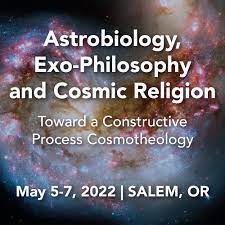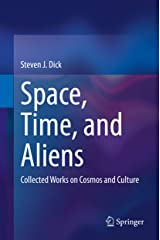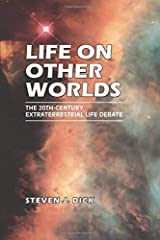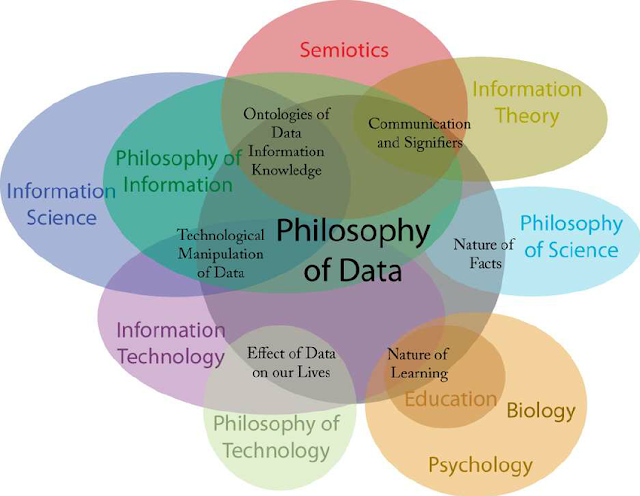Process Cosmotheology and the Biological Universe
Part 2 - A New Philosophic-Theology
Part 3 - Steven Dick's Naturalistic Cosmology
* * * * * * *
Astrobiology, Cosmotheology, and the Biological Universe:
Implications for Religion and Theology
by Steven Dick
October 4, 2022
An Abstract Presented to the Process Group of "Cobb & Friends"
Recent discoveries in astronomy and astrobiology strongly indicate the need for a transformation of established theologies and suggest possibilities for new cosmically-oriented theologies such as cosmotheology.
- As concerning the Biological Universe, the idea that intelligent life in the universe is common necessitates a reconciliation of this new universe with dogmas of the Abrahamic religions in the same way that Thomas Aquinas tried to reconcile natural philosophy and Christianity in 13th century Europe. [Seemingly,] other religions and their associated theologies will be less affected but still need to incorporate the cosmic perspective.
- In particular, discoveries in astronomy and astrobiology resonate with the dynamism of process theology in the sense that all theologies must take into account cosmic evolution and the possibilities of a biological universe in which life may be part of the very fabric of the universe.
- [Assumption] These discoveries also strongly suggest a denial of supernaturalism, a critical eye toward the epistemological status of revelation, and a rethinking of the nature of God and the sacred in the tradition of religious naturalism. In contrast to traditional theologies, human destiny is most universally couched in cosmic terms.
- The endeavor of transforming current theologies and creating new cosmic theologies is broadly characterized as astrotheology, a new and increasingly robust discipline that embraces the possibility of a more universal theology common to all intelligence in the cosmos.
- Astrotheology and its various flavors such as cosmotheology are part of a restructuring of our worldviews, a necessary endeavor as we internalize the realities of the new universe.
Biography
Steven J. Dick served as the NASA Chief Historian and Director of the NASA History Office from 2003 to 2009. Prior to that he was an astronomer and historian of science at the U.S. Naval Observatory for more than two decades. He was the 2014 Baruch S. Blumberg NASA/Library of Congress Chair in Astrobiology at the Library of Congress’s John W. Kluge Center. In 2013, he testified before the United States Congress on the subject of astrobiology. From 2011 to 2012 he held the Charles A. Lindbergh Chair in Aerospace History at the National Air and Space Museum.
Dicks is the author or editor of 25 books, including most recently Astrobiology, Discovery, and Societal Impact (Cambridge, 2018), Classifying the Cosmos: How We Can Make Sense of the Celestial Landscape (Springer, 2019), and Space, Time, and Aliens: Collected Works on Cosmos and Culture (Springer, 2020).
In 2006, Dick received the LeRoy E. Doggett Prize from the American Astronomical Society for a career that has significantly influenced the field of the history of astronomy. He is the recipient of the NASA Exceptional Service Medal, the Navy Meritorious Civilian Service Medal, and the NASA Group Achievement Award for his work on astrobiology. He has served as President of the History of Astronomy Commission of the International Astronomical Union and as Chair of the Historical Astronomy Division of the American Astronomical Society. He has been elected a Fellow of the American Association for the Advancement of Science and a Fellow of the American Astronomical Society. Minor planet 6544 Steven Dick was named in his honor.
More information at http://www.stevenjdick.com/index.html
* * * * * * *
Stephen J. Dick Cosmotheology
Presented to "Cobb & Friends"
by Steven J. Dick
October 4, 2022
A Few Notes by RE Slater
*Steven's presentation consisted of reading from his Power Point slides even as Andrew Davis would later do himself the following week. Notes were mostly unneeded because of the thoroughness of each presenter's slides.
*metaphysics = met·a·phys·ics (noun) - the branch of philosophy that deals with the first principles of things, including abstract concepts such as being, knowing, substance, cause, identity, time, and space.
Question:
Would you regard metaphysics as a discipline of a Naturalistic Cosmology?
Response:
Cosmologists would regard the question of the initial conditions for the universe as belonging to the realm of metaphysics or religion and not to the proper study of cosmology. Metaphysics would be considered an abstract theory with no basis in reality.
Question:
What is metaphysics in simple words?
Response:
It is derived from the Greek word meta ta physika ("after the things of nature"); referring to an idea, doctrine, or posited reality outside of human sense perception.
In modern philosophical terminology, metaphysics refers to the studies of what cannot be reached through objective studies of material reality. It is beyond the physics of the observer.
Steven Dick
Oct 3, 2021
This interview is featured as part of a course
available at https://www.arewealone.us/
Video Contents
Wikipedia - AstrotheologyAstrotheology, astral mysticism, astral religion, astral or stellar theology (also referred to as astral or star worship) is the worship of the stars (individually or together as the night sky), the planets, and other heavenly bodies as deities, or the association of deities with heavenly bodies. In anthropological literature these systems of practice may be referred to as astral cults.In the 21st century the term astrotheology is used by Jan Irvin, Jordan Maxwell and Andrew Rutajit (2006) in reference to "the earliest known forms of religion and nature worship," advocating the entheogen (drug-induced) theory of the origin of religion:The evolutionary origin of religions and religious behavior is a field of study related to evolutionary psychology, the origin of language and mythology, and cross-cultural comparison of the anthropology of religion. Some subjects of interest include Neolithic religion, evidence for spirituality or cultic behavior in the Upper Paleolithic, and similarities in great ape behavior.
As Science developed Astrotheologies gave way
as explanations for the origin of life...
What we know now of our Galaxy
Wikipedia - AstrobiologyAstrobiology, and the related field of exobiology, is an interdisciplinary scientific field that studies the origins, early evolution, distribution, and future of life in the universe. Astrobiology is the multidisciplinary field that investigates the deterministic conditions and contingent events with which life arises, distributes, and evolves in the universe. It considers the question of whether extraterrestrial life exists, and if it does, how humans can detect it.
Astrobiology makes use of molecular biology, biophysics, biochemistry, chemistry, astronomy, physical cosmology, exoplanetology, geology, paleontology, and ichnology to investigate the possibility of life on other worlds and help recognize biospheres that might be different from that on Earth. The origin and early evolution of life is an inseparable part of the discipline of astrobiology. Astrobiology concerns itself with interpretation of existing scientific data, and although speculation is entertained to give context, astrobiology concerns itself primarily with hypotheses that fit firmly into existing scientific theories.
This interdisciplinary field encompasses research on the origin of planetary systems, origins of organic compounds in space, rock-water-carbon interactions, abiogenesis on Earth, planetary habitability, research on biosignatures for life detection, and studies on the potential for life to adapt to challenges on Earth and in outer space.Biochemistry may have begun shortly after the Big Bang, 13.8 billion years ago, during a habitable epoch when the Universe was only 10–17 million years old. According to the panspermia hypothesis, microscopic life—distributed by meteoroids, asteroids and other small Solar System bodies—may exist throughout the universe. According to research published in August 2015, very large galaxies may be more favorable to the creation and development of habitable planets than such smaller galaxies as the Milky Way. Nonetheless, Earth is the only place in the universe known to harbor life at this time. Estimates of habitable zones around other stars, sometimes referred to as "Goldilocks zones", along with the discovery of thousands of extrasolar planets and new insights into extreme habitats here on Earth, suggest that there may be many more habitable places in the universe than considered possible until very recently.Current studies on the planet Mars by the Curiosity and Perseverance rovers are searching for evidence of ancient life as well as plains related to ancient rivers or lakes that may have been habitable. The search for evidence of habitability, taphonomy (related to fossils), and organic molecules on the planet Mars is now a primary NASA and ESA objective.Even if extraterrestrial life is never discovered, the interdisciplinary nature of astrobiology, and the cosmic and evolutionary perspectives engendered by it, may still result in a range of benefits here on Earth.
Toward a Constructive Naturalistic Cosmotheology
by Steven J. Dick
Cosmotheology is a theology that takes into account what we know about the universe based on science. It is therefore a naturalistic theology in the tradition of religious naturalism.
This [excerpted] chapter takes as its foundational assumption the concept that the supernatural does not exist.
Following this concept, we present six principles of cosmotheology, including the idea that:
- we are not physically, biologically, cognitively, or morally central in the universe;
- that any [unnecessary] concept of God must be grounded in naturalistic cosmic evolution;
- that it must have an expansive moral dimension, an astroethics extending to all life in the universe;
- and that while a human destiny linked to cosmic evolution rather than supernaturalism is a radical departure from the past, it is in the end beneficial and liberating.
Such a worldview resolves many ancient theological problems:
- Bad things happen to good people because the universe is hostile rather than loving.
- Yet the prospect of contact with life beyond Earth leaves open the possibility of interacting with that life, and the idea of a loving and compassionate God can be expressed naturally in the way we treat our fellow humans and other creatures in the universe without resorting to supernaturalism.
Stripped of supernaturalism and other accoutrements, compassion is at the core of all religions, even if the ideal is not always met, and universal compassion is at the core of cosmotheology.
Steven Dicks' Seminars, Publications, Forum Discussions, and more...
------------------------------------------------
SELECT WEEK 1 COMMENTS
------------------------------------------------
From RE Slater to everyone 01:57 PM [edited]
From what I understand of Whiteheadian Process Philosophy is that:
- It already inhabits Steven Dick's questions...
- That Whitehead is deeply centered in the cosmo-metaphysical (sic, cosmo-ecological)...
- And by extending any ancient religion's identity of themselves (including the Judeo-Christian faith) that a faith metaphysic is naturally located in the God of the meta-verse et al...
- Further, for many non-processual theologies, such statements will require better responses than they have now.
- By implication I think of all natural theologies of the earth including all sciences and socio-politico categories as inherently and naturally processual (whether admitted or not) as reflecting a naturally processual creation...
- Examples would be the studies of processual evolution, processual quantum sciences, processual Jungian Arche-types, etc and etc. Hence, all creation may very adequately be described in terms of processual Whiteheadian process philosophy and its later development of process theology.
- Finally, the questions being asked are all easily and quite naturally being answered in process philosophy and theology's metaphysics.
From Jay McDaniel to Everyone 02:02 PM
I really appreciate this talk. It seems to me that there are many connections with the process tradition:
I really appreciate this talk. It seems to me that there are many connections with the process tradition:
- the notion that wherever there is actuality there is something like experience
- the idea that God is a lure within the whole of the cosmos, not the earth alone
- the idea that we humans are part of, not apart from, a larger web of becomings, including galactic becomings
Here's an essay I wrote called "A New Sense of Transcendences: Expanding religious horizons."
* * * * * * * *
Cosmotheology: Steven J. Dick
by Ted Peters
May 13, 2022
Some books stimulate kairos excitement. Like watching your favorite player hit a home run, I cheered when I first read Steven J. Dick’s Plurality of Worlds: The Extraterrestrial Life Debate from Democritus to Kant (Dick, 1982). Since its publication in 1982, others such as Michael J. Crowe have similarly documented the story of our terrestrial ancestors thinking about our extraterrestrial neighbors (Crowe, 1988).
Dick’s Plurality of Worlds first substantiated for me how speculations about sharing our universe with off-Earth civilizations has been with us since the birth of our own civilization. Neither the Greco-Roman worldview nor the medieval Christian worldview would find sharing our universe with ET anathema. Dire tabloid predictions that alien contact would allegedly destroy our fragile inherited religious traditions go limp in the face of the kind of knowledge Dick makes available.
That’s history. What about the present?
Steven Dick along with colleagues indefatigably produces the kind of scholarship that prepares us for the societal impact of astrobiology and its dramatic discoveries. His fine volume, Astrobiology, Discovery, and Societal Impact, is a vivid case in point (Dick, 2018).
Dick is also a constructive thinker. For the last two decades he has been constructing a cosmic centered ethics along with his version of cosmotheology. [1] You can find a cosmotheology manifesto in the book we published at CTNS (Center for Theology and the Natural Sciences) in 2018, Astrotheology: Science and Theology Meet Extraterrestrial Life. (Peters, 2018, Chapter 14)

Astrotheology, Process Theology, and Cosmic Consciousness
The first week of May found me and some of my favorite colleagues conferencing at Willamette University on “Astrotheology, Exo-Philosophy, and Cosmic Religion.”
This dialogue between astrobiologists and process philosophers was sponsored by the Center for Process Studies, headed by Andrew M. Davis.
The Smithsonian’s Constance Bertka opened with an overview of Astrotheology. She was followed by NASA historian Steven Dick, developing his [naturalistic] Cosmotheology. The process philosophers responded, critiqued, and integrated. Look in the future for a published volume of the proceedings.
Astrotheology as Public Theology
Public theology may be conceived in the church and critically refined in the academy, but public theology's chief feature is that it is offered to the wider public for the sake of the common good.
Steve Dick’s cosmotheology is offered to the wider public for the sake of the common good:
“In a nutshell, public theology (theologica publica) is concerned with the public affairs or institutions of society (res publica) to promote the common good in society” avers Lutheran public theologian Paul S. Chung (Chung 2022, 11).
Or, in the words of South African leader, John deGruchy, “Christian witness in secular democratic society means promoting the common good by witnessing to core values rather than seeking privilege for the Christian religion” (DeGruchy, 2007).
With the common good in mind, I observe that Dick’s cosmotheology is offered to the wider public rather than the church. And, it is offered for the common good of all Earth’s residents.
.jpg)









.jpg)
.jpg)
.jpg)
.jpg)
.jpg)
.jpg)



.jpg)
.jpg)
.jpg)
.jpg)


.jpg)
.jpg)
.jpg)
.jpg)
.jpg)
.jpg)
.jpg)
.jpg)
.jpg)

.jpg)
.jpg)
.jpg)
.jpg)
.jpg)
.jpg)
.jpg)
.jpg)
.jpg)
.jpg)
.jpg)
.jpg)
.jpg)
.jpg)
.jpg)













